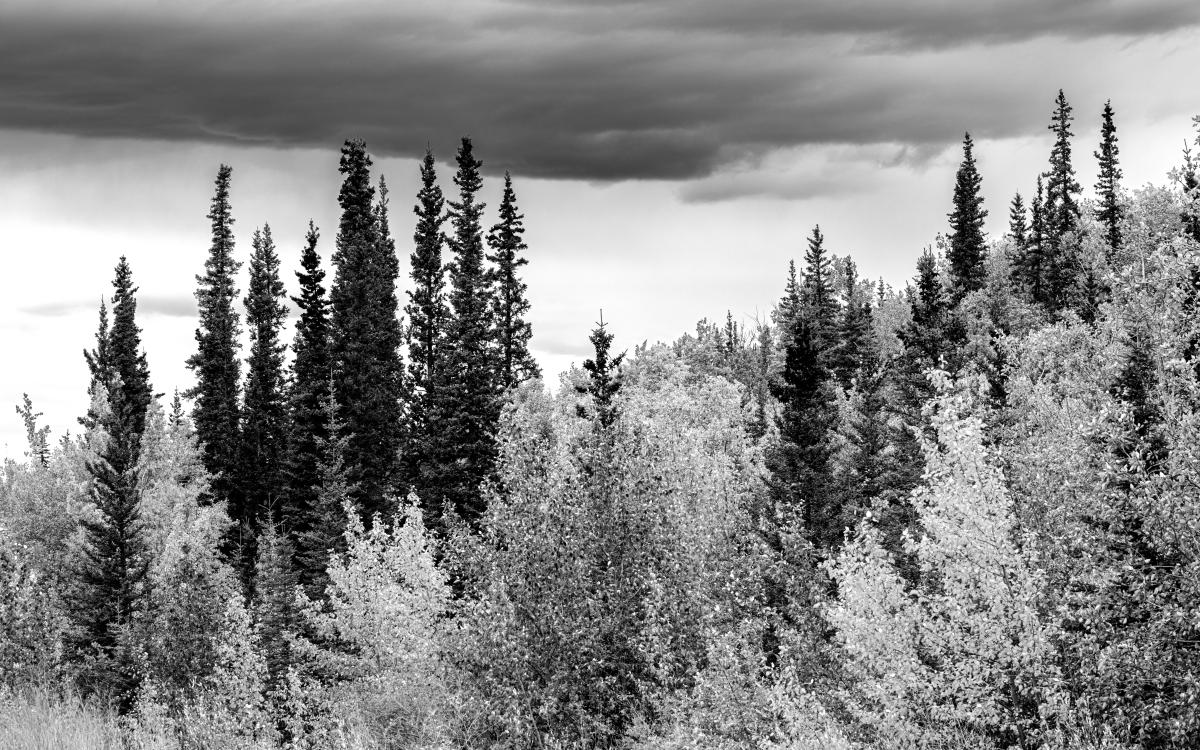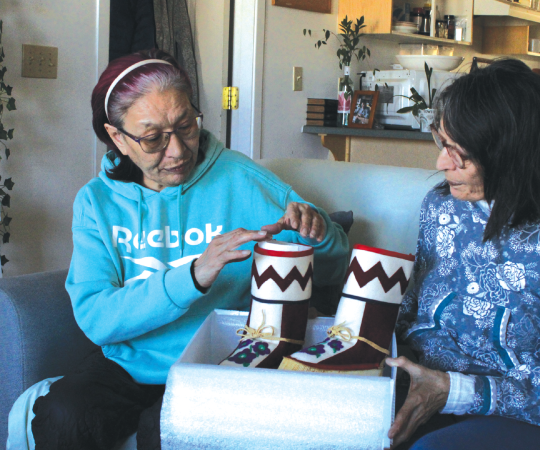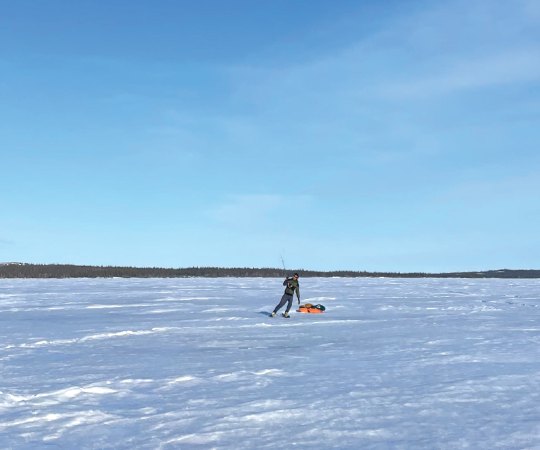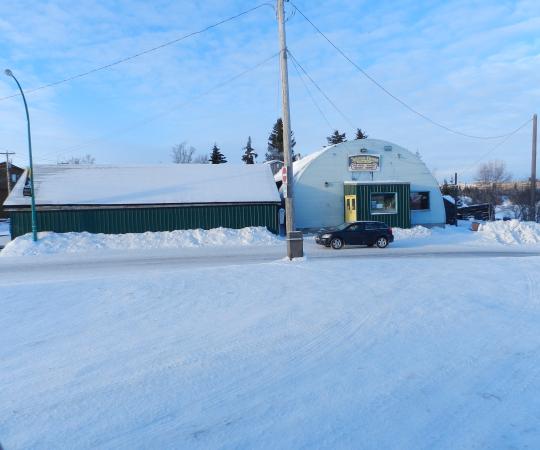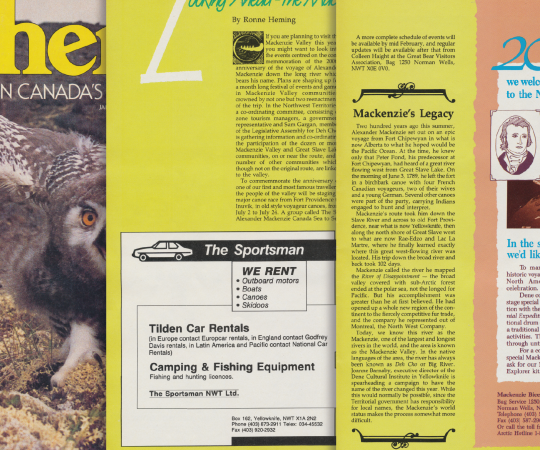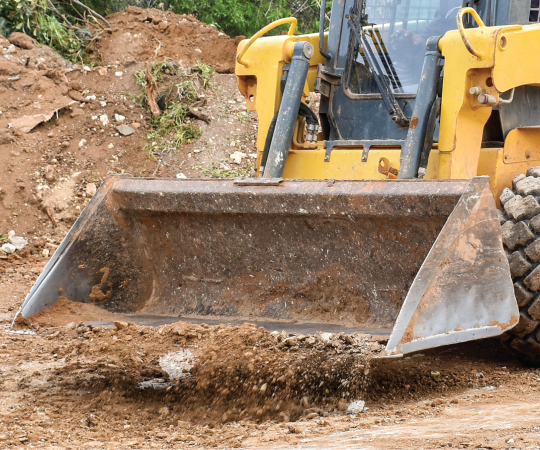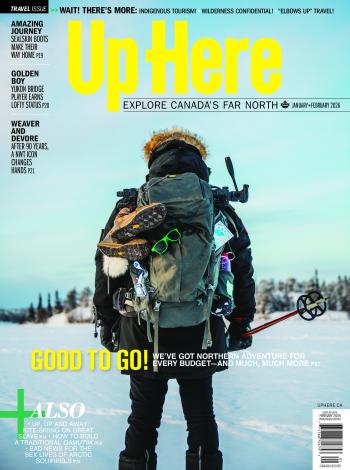THE FIRST THING to go wrong was freeze-up. Small chunks of ice started to appear in the Pelly River, floating alongside the fibreglass skiff and canoe that Mitch Fichten and Evan Russell were navigating downstream. It was the end of October, so late in the season that most river-savvy Yukoners wouldn’t choose to be on moving water. The two men, both 27 years old and friends since childhood, kept floating for another day or two, until the chunks of ice became the size of cars. Then they navigated the boats to shore, where they started a fire, brewed orange pekoe tea and made instant coffee. They’d paddled the Pelly the summer before and knew they were approaching a set of rapids. With the ice, they worried about getting through safely.
This was not good. The plan had been to get to the confluence with the Tay River, where Russell had dropped off a load of gear—including a wall tent, warm clothes, snowshoes, winter sleeping bags and a chainsaw—by boat a couple of weeks before. Once there, about 60 kilometres from where the men were living in Faro, they intended to spend anywhere from six weeks to three months in the bush, camping and scouting the area in advance of the gold prospecting they wanted to do in the spring. The plan was to stake a claim, then build a cabin. It was late 2021, at the height of the pandemic’s vaccine-mandate phase, and both men were unemployed. At the very least, they figured, the journey would be one hell of an adventure.
But they hadn’t banked on getting separated from their warm gear as winter was about to hit hard.

Photos courtesy of Trophy Stone Outfitting
FICHTEN AND RUSSELL met in Castlegar, B.C., when they sat next to each other in their Grade 8 classroom. They both liked spending time outside and, over the years, they paddled, hiked, camped and hunted grouse and white-tailed deer together. Fichten thought Russell was a genius and appreciated his quirky sense of humour. Russell liked gaming and creating art on his tablet—and he built his friend’s first computer. Fichten went on to work as a heavy equipment operator and labourer, while Russell became a carpenter. Both had brown hair, and Russell was leaner and a few inches taller. They lived together as roommates a couple of times as they moved around Alberta, going where the work was.
Before the pandemic, Russell left for the Yukon, where he worked for family in Whitehorse before buying a duplex in Faro, a former mining town about four hours northeast. He invited Fichten, who quit his job at an Alberta sawmill, to come north. Fichten had grown up watching the Discovery Channel with his dad, and any mention of the Yukon had him hooked. In March 2020, just as COVID-19 started to trigger global worry, Fichten moved into Russell’s house. The two men befriended their neighbour, Neil Yee, and the trio fished and hunted together. To Yee, they seemed to fancy themselves as survivalists, though he wasn’t wowed by their wilderness skills—on one outing, they struggled to kill a porcupine with bows and arrows and an airgun.
The two friends had had many adventures—and a few misadventures—together. When hiking in British Columbia’s Valhalla Provincial Park, Russell saved Fichten from falling off a cliff. When they paddled the Pelly River in the summer of 2020, Russell capsized in the rapids and Fichten had to save him. (Yee says the two men were in one canoe when they flipped.)
It was Russell’s idea to go down to the Tay River. They decided to tell their families they were spending the winter on a trapline near Watson Lake, a six-hour drive south, and to call police if they weren’t back by June. It was an odd bit of subterfuge, but they both wanted an open-ended adventure, with the opportunity to get sidetracked and spend more time in the wilderness if they felt like it. They told the same story to Yee, but he didn’t believe it—he knew Russell had boated down the Pelly River to drop off some gear. They planned to be gone for up to three months, but they packed what they ballparked was three to six months’ worth of food.
The two friends talked about the trip for several months, but their departure was rushed. On October 26, gunshots sounded in quiet Faro as a resident shot and killed his estranged wife and another man and injured a third person. That pushed Fichten and Russell to leave as soon as they could, but it also overshadowed the danger of what they were doing. They left in the morning the next day, freaked out, not knowing who’d been shot or who the shooter was. They took a basic GPS but not a communication device, such as a satellite phone or an inReach, because they couldn’t afford one, though they spent about $1,600 on their wall tent. Russell texted Yee before they were out of cell service to say they were on their way to the trapline.

Land of Dreams Fichten grew up watching the discovery channel and fell in love with the yukon
ONCE THEY GOT STUCK on the side of the river, they decided to make that spot their main camp—it was where the bulk of their food was. Then they bushwhacked 20 kilometres to the Tay to fetch as much as they could carry back to their camp on the Pelly. Having their essentials split between two sites was not ideal. At the Tay, Fichten stuffed his sleeping bag, parka, snow pants and wool socks into his 60-litre backpack and strapped his snowshoes onto it. Back at the Pelly site, they built a tipi-style shelter using a big green tarp, spruce trees and boughs. When Fichten found a fish camp nearby, Russell used the battery-operated power tools they’d brought to turn a steel drum into a wood stove that the men put inside their shelter. They spent November and part of December cutting wood to feed the fire, watching snow fall and waiting for the river to freeze.
A month after they’d left, Yee skied about 15 kilometres along the Pelly. He was mildly concerned, and when he told someone else in the community that the men were winter camping downriver, the person contacted RCMP. Police told Yee they’d talked to the men’s families, who’d said they were away until June. Yee considered skiing further out to where he thought they were, but in the winter, alone, he didn’t want to put himself in danger.
After a cold spell in December, the mercury in the thermometer Fichten had nailed to a tree rose to -18°C. Russell decided he’d cross the river and hike up the sloping mountain on the other side. He could see on the map that there was a lake nearby and he wanted to go exploring.
Around Christmas, Russell returned with a smile on his face and a horse-feed bag slung over his shoulder. He pulled out several KitKat and Mr. Big chocolate bars and some toilet paper. He’d found a cabin. Excitedly, he told Fichten it was about eight hours away on snowshoes, on the edge of Glenlyon Lake. They decided to try their luck fishing there, then hike back to Faro.
In early January, they snowshoed to the cabin. A base camp for fly-in guided hunts, it was stocked with backcountry luxuries such as macaroni and cheese, pancake batter, juice mix, chocolate chip cookies and canned meat and vegetables. Russell had several food allergies, so he caught and ate a few small lake trout while Fichten dug into the cabin stash.
Because of Russell’s dietary restrictions, they’d packed separate food supplies and Fichten didn’t realize his friend was running low. He had food remaining at the Pelly camp, so he headed back to the river. The wind blasted his face as he crossed the lake on snowshoes. About 15 metres from shore, he stepped into overflow—water sitting above the ice—up to his knees. He panicked, taking frantic steps forward, but his snowshoes came up out of the water each time with more ice on them. As he pulled his left foot out of the ice, he heard a pop. Then he felt a hot, shooting pain in his hip.
Fichten limped off the lake, but he decided to keep going to the river camp, where he had painkillers and food. After a painful trudge down the mountain, he made it to camp, drenched in sweat, where he hastily started a fire in the stove, then crawled under his blankets. After about a week, Russell showed up. He had advanced first-aid training and told Fichten what he’d suspected: His hip was dislocated. It would probably take six weeks of rest before he could walk normally.
Russell had brought a can of Maxwell House down from the cabin and, for days, the two men drank coffee, sat around the fire and talked. It was like old times. They’d often hiked up mountains, then sat at the top and sipped coffee. Eventually, Russell, who’d run out of food, said he was going to hike the 20 kilometres to the Tay to get his remaining supplies. Fichten gave him some of his food for the journey and Russell said he’d be back in a week. Then, he promised, he’d hike to Faro and get help. They hugged, and Russell left.

Photos courtesy of Trophy Stone Outfitting
FOR THE NEXT WEEK, there was no sign of Russell. After 10 days, Fichten wondered if his friend had abandoned him and headed directly for Faro. Perhaps, he couldn’t bear to tell Fichten how dire things were—maybe he thought his friend was a lost cause and felt he had to save himself. Fichten trusted Russell’s bush skills, so he couldn’t believe that something might’ve happened to him—a fall, an injury. He told himself Russell had gone back to Faro.
Fichten knew he needed to get back to the cabin for any chance of survival. It offered better shelter from the elements and, if he could catch some fish, food. His rifle was there, too—perhaps he could shoot some squirrels. He’d given his large backpack to Russell, so he packed a duffel bag and a small green day pack, placing what remained of his food—rice, frozen potatoes, white navy beans—inside. Then he took a handful of painkillers in preparation for struggling against the snow with his angry hip.
Back at the cabin, little food remained. Ice fishing proved unsuccessful, so he turned to the bags of mouldy horse feed stored in a steel drum behind the structure. His goal: Make the oats edible. He boiled them, but the shells upset his stomach and gave him bloody stools. He picked the shells off by hand, but getting enough to be worth eating took too long. After baking the oats on a pan over the wood stove to kill the mould and loosen up the shells, he ground them using a makeshift mortar and pestle—an aluminum cup and a stick—then sifted out the shells using mosquito screen over the opening of an empty peanut container. That done, he put the oats in a pan and blew off what remained of the shells before frying oat cakes in a cast-iron pan with salt and chili powder. Finally, they were edible.
Winter passed in a methodical routine. Every day, he cut down branches and small trees around the cabin for the wood stove, melted snow for drinking water and ground oats. His hip healed. It occurred to him that if he could make a big batch of oat cakes—say, 100—he could pack them up and snowshoe to Faro. But making the cakes was too time-intensive; it took hours to make two or three. He read books he found in the cabin: a western, a romance novel, James A. Michener’s The Covenant.
As Fichten watched the snow melt, the lake slowly open up and the days get longer, he knew it was spring. After seeing no wildlife except a few wolves across the lake, animals started to return to the landscape. In May, he shot three grouse and a bear. He ate almost everything he could of the bruin, including the hide and brains. Despite the sudden infusion of protein, his body was faring poorly. He had edema in his legs and scrotum, both swelling up. It seemed a matter of time until he was dead.
ONE MORNING, he heard a whirring noise overhead. He opened the cabin door to see a helicopter hovering low over the water. An RCMP officer and a conservation officer jumped out. “Are you Mitchell Fichten?” the cop asked. Then the officer asked where Russell was. “It just broke me then and there,” Fichten says now, “because I knew he didn’t make it.”
It was June 25. Eleven days earlier, Russell’s sister had reported the two men missing. Fichten was choppered to Faro and medevaced to Whitehorse. He had a dangerously low heart rate and had lost at least 70 pounds from his 190-pound frame. While he was in the intensive care unit, RCMP officers questioned him about where Russell might be. Fichten told them about the gear at the Pelly River’s confluence with the Tay. On July 1, searchers found Russell’s remains in that area. The territory’s coroner couldn’t determine a cause of death, but Yukon RCMP said in a news release that they didn’t suspect criminality. “This was an accident,” Fichten says, though he understands why he had to be investigated. “When you have two people go out in the wilderness and one comes back, it’s the word of the person that came back, right?”
Dean Sandulak didn’t know his cabin had helped save someone’s life until the following year, when he heard a podcast interview Fichten did with outdoor retailer Corlane Sporting Goods. When Sandulak, who owns Trophy Stone Outfitting, flew into Glenlyon Lake to see what state the cabin was in, he saw that Fichten had indeed been eating horse feed. He also saw boiled bones, which he assumes were from a bear.
Russell’s sister declined an interview, but Fichten maintains he and his friend didn’t have a death wish, though they did want to have a wilderness experience. “We really trusted ourselves and had experience,” he says. “I wish that things had actually played out the way they were supposed to, because it would have looked like two losers sitting in a tent camping, and it would not have been this giant, stupid thing that happened.”
He has regrets—that they didn’t plan better, that they didn’t tell their families where they were really going, that they didn’t take a communication device, that they didn’t head back to Faro before he injured his hip.
Now, Fichten is living with family in Castlegar, B.C., and is unemployed. He hasn’t gone to therapy, though he spoke to mental-health workers at the hospital in Whitehorse and talked to his family doctor about counselling. (He says the doctor told him that if he felt like he was able to get through the day without breaking down, he didn’t need it.) He acknowledges that what happened was traumatic, but he accepts that he can’t go back and change things.
Although he’s gone winter camping with his brother and taken some day trips with friends since he came back from the Yukon, spending time outdoors doesn’t have the allure it once did. “I lost somebody that I loved,” he says. “I could talk all day about Evan—it just makes me sad. There was a long time after that where I wished it would have been him that made it out. I felt like the world had fucking done a mistake.”

